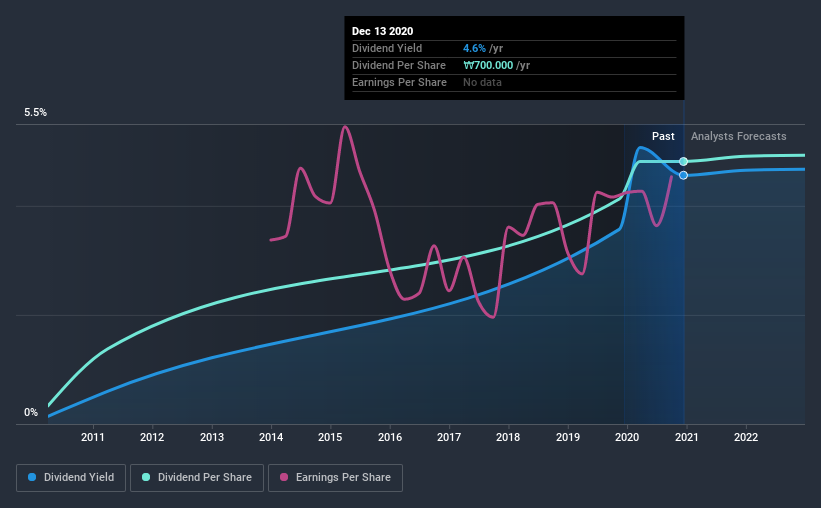- South Korea
- /
- Trade Distributors
- /
- KOSE:A047050
Does Posco International Corporation (KRX:047050) Have A Place In Your Dividend Portfolio?

Today we'll take a closer look at Posco International Corporation (KRX:047050) from a dividend investor's perspective. Owning a strong business and reinvesting the dividends is widely seen as an attractive way of growing your wealth. Unfortunately, it's common for investors to be enticed in by the seemingly attractive yield, and lose money when the company has to cut its dividend payments.
In this case, Posco International likely looks attractive to investors, given its 4.6% dividend yield and a payment history of over ten years. It would not be a surprise to discover that many investors buy it for the dividends. There are a few simple ways to reduce the risks of buying Posco International for its dividend, and we'll go through these below.
Explore this interactive chart for our latest analysis on Posco International!

Payout ratios
Dividends are typically paid from company earnings. If a company pays more in dividends than it earned, then the dividend might become unsustainable - hardly an ideal situation. Comparing dividend payments to a company's net profit after tax is a simple way of reality-checking whether a dividend is sustainable. In the last year, Posco International paid out 39% of its profit as dividends. This is a middling range that strikes a nice balance between paying dividends to shareholders, and retaining enough earnings to invest in future growth. One of the risks is that management reinvests the retained capital poorly instead of paying a higher dividend.
Another important check we do is to see if the free cash flow generated is sufficient to pay the dividend. Posco International paid out 8.0% of its free cash flow as dividends last year, which is conservative and suggests the dividend is sustainable. It's positive to see that Posco International's dividend is covered by both profits and cash flow, since this is generally a sign that the dividend is sustainable, and a lower payout ratio usually suggests a greater margin of safety before the dividend gets cut.
Remember, you can always get a snapshot of Posco International's latest financial position, by checking our visualisation of its financial health.
Dividend Volatility
Before buying a stock for its income, we want to see if the dividends have been stable in the past, and if the company has a track record of maintaining its dividend. For the purpose of this article, we only scrutinise the last decade of Posco International's dividend payments. During this period the dividend has been stable, which could imply the business could have relatively consistent earnings power. During the past 10-year period, the first annual payment was ₩48.5 in 2010, compared to ₩700 last year. This works out to be a compound annual growth rate (CAGR) of approximately 31% a year over that time.
With rapid dividend growth and no notable cuts to the dividend over a lengthy period of time, we think this company has a lot going for it.
Dividend Growth Potential
Dividend payments have been consistent over the past few years, but we should always check if earnings per share (EPS) are growing, as this will help maintain the purchasing power of the dividend. Earnings have grown at around 2.3% a year for the past five years, which is better than seeing them shrink! A payout ratio below 50% leaves ample room to reinvest in the business, and provides finanical flexibility. However, earnings per share are unfortunately not growing much. Might this suggest that the company should pay a higher dividend instead?
Conclusion
To summarise, shareholders should always check that Posco International's dividends are affordable, that its dividend payments are relatively stable, and that it has decent prospects for growing its earnings and dividend. It's great to see that Posco International is paying out a low percentage of its earnings and cash flow. Earnings growth has been limited, but we like that the dividend payments have been fairly consistent. Posco International performs highly under this analysis, although it falls slightly short of our exacting standards. At the right valuation, it could be a solid dividend prospect.
Market movements attest to how highly valued a consistent dividend policy is compared to one which is more unpredictable. However, there are other things to consider for investors when analysing stock performance. Taking the debate a bit further, we've identified 1 warning sign for Posco International that investors need to be conscious of moving forward.
If you are a dividend investor, you might also want to look at our curated list of dividend stocks yielding above 3%.
If you decide to trade Posco International, use the lowest-cost* platform that is rated #1 Overall by Barron’s, Interactive Brokers. Trade stocks, options, futures, forex, bonds and funds on 135 markets, all from a single integrated account. Promoted
New: Manage All Your Stock Portfolios in One Place
We've created the ultimate portfolio companion for stock investors, and it's free.
• Connect an unlimited number of Portfolios and see your total in one currency
• Be alerted to new Warning Signs or Risks via email or mobile
• Track the Fair Value of your stocks
This article by Simply Wall St is general in nature. It does not constitute a recommendation to buy or sell any stock, and does not take account of your objectives, or your financial situation. We aim to bring you long-term focused analysis driven by fundamental data. Note that our analysis may not factor in the latest price-sensitive company announcements or qualitative material. Simply Wall St has no position in any stocks mentioned.
*Interactive Brokers Rated Lowest Cost Broker by StockBrokers.com Annual Online Review 2020
Have feedback on this article? Concerned about the content? Get in touch with us directly. Alternatively, email editorial-team@simplywallst.com.
About KOSE:A047050
Posco International
An integrated business company, operates in trade, resources, and infrastructure development/operation businesses.
Good value with adequate balance sheet.
Market Insights
Community Narratives




